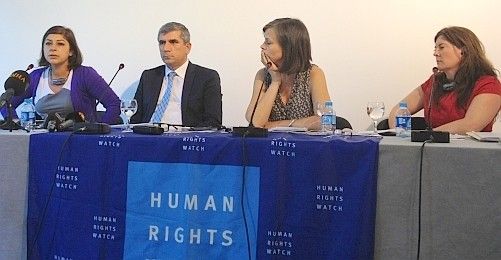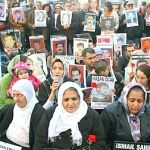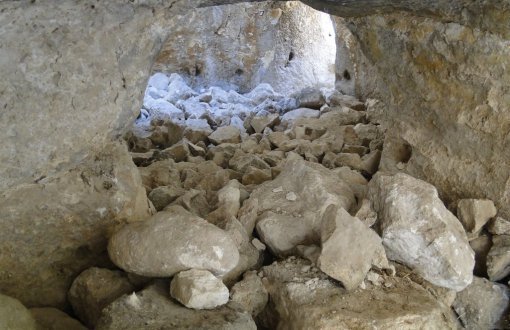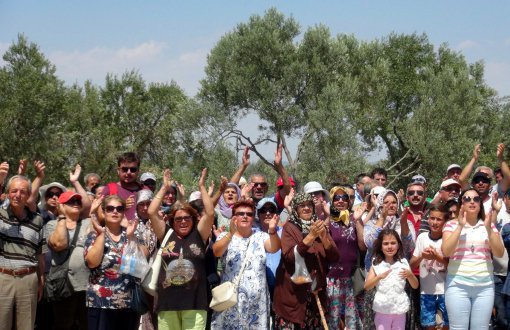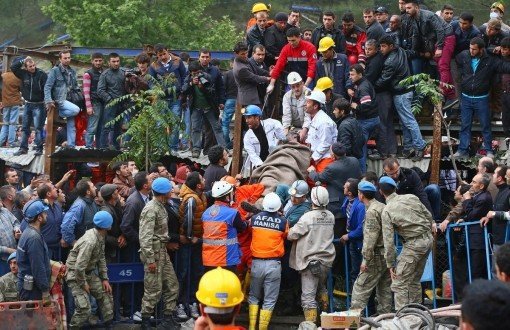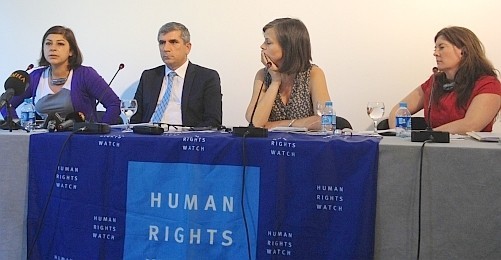
Emma Sinclair-Webb, the representative of the Human Rights Watch (HRW) to Turkey, cautioned that the statue of limitations would begin to apply in three years with respect to unresolved murders and disappearances that took place in the 1990s, while speaking at a meeting in Istanbul.
The HRW's legal advisor Aisling Reidy, lawyer Tahir Elçi, as well as Deniz Gülünay and Hazni Doğan, the acquaintances of two disappeared persons, attended the event at the Cezayir Meeting Hall in relation to a press release issued by the HRW on Monday called "Time for Justice: Ending Impunity for Killings and Disappearances in 1990s Turkey."
Emma Sinclair-Webb called for current legislation on the statute of limitations to be amended in the Fourth Judicial Reform Package. Webb argued that cases involving torture and violations of the right to life should be exempt from the statute of limitations.
Webb also highlighted the case of retired colonel Cemal Temizöz, a gendarmerie commander accused of involvement in 20 unresolved murders that took place in the southeast during the 1990s. The HRW's report had also brought up Ret. Col. Temizöz's case as the one and only such trial with respect to rights abuses committed by security forces in the 1990s.
Webb further argued for providing protection for witnesses, the appointment of experienced prosecutors to such trials, the abolition of the "village guard" system (local paramilitary forces armed and directed by the gendarmerie) and the establishment of a truth commission in Parliament.
The usual suspects
Hazni Doğan whose 13 year old brother disappeared under custody in the district of Dargeçit in the southeastern province of Mardin said the culprits of their case were evident:
"Soldiers took my brother under custody at 03:00 at night with armored vehicles. Then they also took me on the road and placed me under detention. I saw my brother on a strappado, unable to walk. When I got out, my mother went ahead to inquire about her son, and they told her not to look for him. When my mother wrote a petition and spoke to the press to find her son, then she also disappeared for 35 days. Afterwards, she also became a 'Saturday mother.' Both my parents died of sorrow. It was not only my brother but also my parents who disappeared under the [custody of the] state," he said.
Doğan also added that his brothers' bones were excavated in February after villagers notified the officials, but they were yet to hear a response from the Forensics Institute on the issue after a lapse of seven months.
"Look for Hasan on the mountains of Dersim"
Police took Deniz Gülünay under custody for unfurling a banner from a cafe window near Istanbul's Taksim Square on July 20, the same date the statute of limitations came into force over the disappearance of his father Hasan Gülünay.
"My mother went on a month long hunger strike after she was told that my father had not been detained. The police then said he was under custody and that he would appear before the prosecutor's office. However, they denied this after my mother spoke to the press about the issue, and they consequently told her to look for Hasan on the mountains of [the southeastern province of Dersim (Tunceli.) Later, a corpse was found in [Istanbul's] Gebze district that resembled my father. They said she had not told them that her husband was a 'terrorist,' and that the corpse did not belong to him either.She was consequently not allowed to identify the corpse," he said.
The corpse in Gebze did, in fact, belong to his father, Gülünay said, adding that legal procedures were still underway to unearth the graves. Even if they could locate his father's grave, the parties responsible for the affair would still not receive any penalties once after the statute of limitations come into effect, she also added.
"Time not on the side of the disappeared"
Lawyer Tahir Elçi, on the other hand, pointed out that families could not even petition the officials due to the pervasive climate of fear in the 1990s. Even if they did hand over a petition, the files kept waiting for years at the prosecutor's office anyway, he said.
Many cases were finally referred to the European Court of Human Rights (ECHR) after the litigant parties exhausted all domestic avenues to seek justice, he noted.
"The ECHR not only convicted Turkey of paying reparations but also said the investigations had to be restarted. We also want [Turkey] to comply with the decisions of the ECHR," Elçi said.
Time, however, is not on the side of the disappeared, as witnesses' memories begin to fade, and evidence begins to get lost, he said and stressed the need to establish a bank to contain the DNA samples of people found in graves.
Aisling Reidy also highlighted the need to establish truth commissions and noted that many generals and colonels in Latin America, and particularly in Argentina, were standing trial in connection with the cases of the disappeared and unresolved murders. "Why should that not happen in Turkey?" he asked. (NV)





